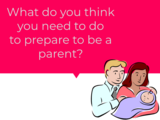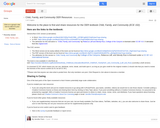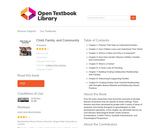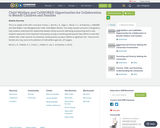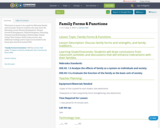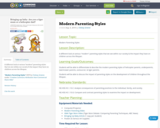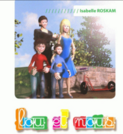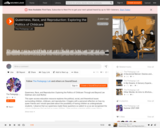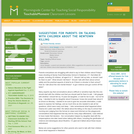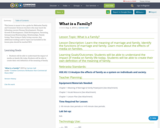Lou is a young child presenting problem behaviors. At home, at school, or outdoors, Lou’s parents try different methods of correcting Lou’s behaviors, and evaluating their efficacy in the immediate, and longer, term.
The interactive program offers a rich simulation of situations parents and children in such circumstances might face. Whilst studiosly avoiding any suggestion of easily and universally applicable methods, the interactive program invites parents and professionals in training to reflect on the adequacy of their disciplinary and other child-rearing styles, and the impact of stress and fatigue on family functioning, related to environmental variables in their lives. The interactive program also proposes a series of « golden rules » parents and professionals in training can use as helpful guidelines and points of reference in promoting the welfare of their children and enhancing family functioning.
Use of the interactive program, which should always happen when their is professional supervision and accompaniment, by a parent, in a parental couple with or without the involvement of the child concerned, in a group of parents, or by a psychologist in training, contributes to improvement in child-rearing practices, the feeling of parental competence, co-parenting relationships, and communication with the child in question and other children who may be part of the family setting.
The interactive program’s playful and modern approach makes for an indispensable tool for psychologists and family educators working with young children with problem behavior, and their parents.
The interactive program may be used in four languages (English, French, German, and Spanish), and is accompanied by a manual in English and French describing the theoretical and empirical bases for the interactive program and its uses, as well as guidelines for using the video which are especially apt for professionals working in the educational guidance of parents and families.
Standard instructions regarding the training of students in the helping professions are also available on the interactive program. These instructions are aimed at professors in higher education in the domains of family psychology, family education, and cognitive-behavioral therapy. They permit psychologists and other professionals in training to understand how best to use the interactive program and focus its use in the broader context of their working relationships with one another and with families and children.
Lou est un jeune enfant présentant des difficultés de comportement. A la maison, à l’école ou en promenade, ses parents font des choix éducatifs et en évaluent l’efficacité immédiate et à long terme. Le programme interactif se présente comme un simulateur de situations éducatives. Sans jamais induire que l’éducation d’un enfant se réduirait à une recette universelle, il emmène parents et professionnels dans une réflexion à propos de l’adéquation des réponses éducatives en regard des comportements de l’enfant, de l’impact du stress et de la fatigue sur le fonctionnement familial, de l’importance des variables environnementales. Il propose un ensemble de « règles d’or » agissant comme des points de repère. Son utilisation par le psychologue en formation, le parent seul, en couple parental, avec ou sans leur(s) enfant(s), en groupe de parents, accompagné ou non d’un professionnel de la guidance, contribue par ailleurs à favoriser le travail thérapeutique portant sur la fonction parentale, la relation coparentale et la communication avec l’enfant. Son approche ludique en fait un outil indispensable aux psychologues et aux éducateurs familiaux travaillant auprès de jeunes enfants présentant des troubles du comportement et de leurs parents.
Le programme interactif est présenté en quatre langues (français, anglais, allemand et espagnol). Il est accompagné d’un manuel en français et en anglais donnant des indications sur ses fondements théoriques et des conseils d’utilisation à destination des professionnels de la guidance éducative.
Des consignes standardisées relatives à la formation des étudiants sont également disponibles . Elles sont destinées aux professeurs de l’enseignement supérieur et des universités dans les domaines de la psychologie de la famille, de l’éducation familiale et de la thérapie cognitivo-comportementale. Elles permettent d’orienter le travail des psychologues en formation à partir du programme interactif.
